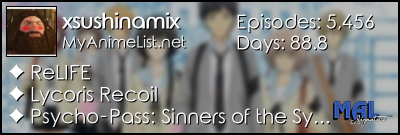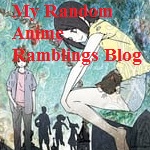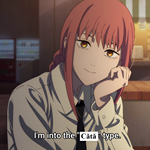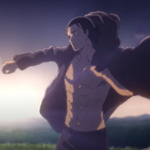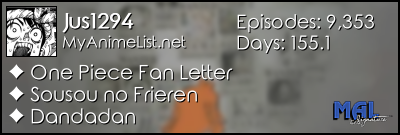New
Nov 13, 2020 11:55 PM
#1
| Our Japanese language tutor points out errors that appear in translations of Japanese words to English. Eg the incorrect translation of the word tenki (天気) as weather or shokuji (食事) as the noun meal and other similar issues. Which is an anime that suffered the most out of it? No need to know the language yourself, you could read comments and reviews of Japanese speaking users too. I refer to official subs mainly not fansubbers that are not always proficient. One series is Texhnolyze. I remember 12 years ago a guy in another forum that knew Japanese said that the official English localisation was awful, changing many meanings to the point of requiring a retranslation. Unfortunately no fansubbers took such an endeavor. I'd like to rewatch that series again sometime to combine it with the translation. What other series can you think off? |
Nov 14, 2020 12:10 AM
#2
| The Monogatari series loses half of its subtlety when being translated into English as there's a lot of wordplay that's only meant for the Japanese language. |
MAL EMOJIS - Get your specially formatted emojis for MAL forums.        |
Nov 14, 2020 12:15 AM
#3
| this one will probably be said multiple times: the monogatari series, due to it actually being a novel it has a lot of conversations and things that explain that world build everyone who know both english japanese doesnt understand how so many ppl like the series because a lot of the story is lost in translaion |
Nov 14, 2020 12:17 AM
#4
_cjessop19_ said: The Monogatari series loses half of its subtlety when being translated into English as there's a lot of wordplay that's only meant for the Japanese language. Yeah, Monogatari series is the first to come to mind because of its wordplay tendencies (and various other references not limited to Japan) that could be really obscure at times and are hard to catch unless you're knowledgeable about Japan stuff. Having read some (for reference, Otorimonogatari, Koimonogatari, and Tsukimonogatari) of the official English translations of some of the Monogatari light novels, I can confidently say that some of the attempts to emulate the Japanese wordplay in the English language are mostly hit or miss. An example of this would be Hachikuji's name wordplayed as Namekuji. Hachikuji's character is related to a snail and Namekuji means slug; basically a snail -> slug wordplay pun. In the official English translation, this wordplay was changed into Hachikuji into Muckyoozy (since slugs are oozy or whatever), which is not a bad attempt at all but it seems forced. |
SuzouNov 14, 2020 12:25 AM
 >>> Check out my Anime list! <<< >>> Check out my Manga list! <<< Drop everything and read Chainsaw Man! |
Nov 14, 2020 12:25 AM
#5
| I don't think there is an anime that will completely change due to an impossible translation, japanese isn't that weird but some meaning will be lost due to stuff like the large number of japanese personal pronouns for example. |
| MEA·MENTVLA·INGENS·EST |
Nov 14, 2020 12:34 AM
#6
| Well, Seitokai Yakuindomo ofc... The jokes rely very heavily on japanese pun n japanese proverbs, which ofc most of the time doesn't make any sense when translated to english.. |
 Try reading Spy x Family Manga ^_^ U will love it, i promise... |
Nov 14, 2020 12:42 AM
#7
| Lots of people mentioning Monogatari Series and i agree, and there's one more for me. It's Chihayafuru. I just don't understand the whole concept of karuta games, plus the meaning of each card has not-so-easy literary languange level. If you watch fansub then luckily the fan TL will usually give extra explanation which i adore. |
Nov 14, 2020 8:04 AM
#8
Playay said: I haven’t watched Chihayafuru but this is a great point! It’s very hard to translate culture.Lots of people mentioning Monogatari Series and i agree, and there's one more for me. It's Chihayafuru. I just don't understand the whole concept of karuta games, plus the meaning of each card has not-so-easy literary languange level. If you watch fansub then luckily the fan TL will usually give extra explanation which i adore. |
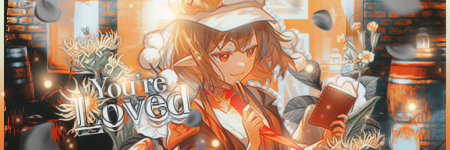 |
Nov 14, 2020 8:13 AM
#9
| Ofukuro is evidently impossible to translate, as the Rinne subs do not translate it. |
| その目だれの目? |
Nov 14, 2020 8:25 AM
#10
| I strongly disagree with the people who said monogatari, everything is understandable, there is no hidden meaning, only fans who petend their anime is conplicated. and the character problems are understandable, nothing is lost in translation, only bad puns about hanekawa's boobs or siscon stuff. seitokai yakuindomo, because all anime is a giant sex joke pun in japanese, maybe kitakubu too, they do the same but no sex jokes unfortunatelly. |
Nov 14, 2020 8:30 AM
#11
petran79 said: Our Japanese language tutor points out errors that appear in translations of Japanese words to English. Eg the incorrect translation of the word tenki (天気) as weather or shokuji (食事) as the noun meal and other similar issues. I think these words are a poor example of your point. |
Nov 14, 2020 8:44 AM
#12
| There's a few lines of dialogue in "Kimi no Na wa." that are untranslatable. Japanese has separate masculine and feminine words for the pronoun 'I' as well as formal and informal versions, and there is a gag where Mitsuha, body-swapped as Taki, uses the wrong pronouns before landing on the correct one. The gag doesn't translate because English lacks these distinctions and uses 'I' for all of them. |
A møøse once bit my sister... |
Nov 14, 2020 9:09 AM
#13
Catalano said: Well it's not like us praising Monogatari Series or somewhat, it's understandable, yeah, the anime. When you compare it to light novel or manga version of the series, it gets harder and weirder word play plus japanese culture that even TL has given an extra note, it's still hard to understand.I strongly disagree with the people who said monogatari, everything is understandable, there is no hidden meaning, only fans who petend their anime is conplicated. and the character problems are understandable, nothing is lost in translation, only bad puns about hanekawa's boobs or siscon stuff. |
Nov 14, 2020 9:39 AM
#14
Playay said: Catalano said: Well it's not like us praising Monogatari Series or somewhat, it's understandable, yeah, the anime. When you compare it to light novel or manga version of the series, it gets harder and weirder word play plus japanese culture that even TL has given an extra note, it's still hard to understand.I strongly disagree with the people who said monogatari, everything is understandable, there is no hidden meaning, only fans who petend their anime is conplicated. and the character problems are understandable, nothing is lost in translation, only bad puns about hanekawa's boobs or siscon stuff. how is this different than a murakami novel for example? the wind up bird chronicle book uses more weird stuff than a teen book like monogatari and you don't hear elitists speaking about it. why I don't hear americans talking about the brothers karamazov novel, it's translated from russian but if course, monogatari is the center of the world, we all praise hanekawa's boobs |
Nov 14, 2020 9:44 AM
#15
Catalano said: Forgot to mention that this case isn't happened to all audience. There are some people that don't understand, and i am as one of the fans of the series just agreeing with those people to respectively appreciate the struggle of understanding a story. You know, there are people who just shouting out loud their favorite anime for being "too good" and "genius", and you could say that i'm one of them. Bad personalities, blame me.Playay said: Catalano said: I strongly disagree with the people who said monogatari, everything is understandable, there is no hidden meaning, only fans who petend their anime is conplicated. and the character problems are understandable, nothing is lost in translation, only bad puns about hanekawa's boobs or siscon stuff. how is this different than a murakami novel for example? the wind up bird chronicle book uses more weird stuff than a teen book like monogatari and you don't hear elitists speaking about it. why I don't hear americans talking about the brothers karamazov novel, it's translated from russian but if course, monogatari is the center of the world, we all praise hanekawa's boobs |
Nov 14, 2020 9:49 AM
#16
| Monogatari might have hurt someone's butt, I don't know... |
| If you're a fanboy, please don't waste my time. Watch more movies, please. Perhaps, this is hell. |
Nov 14, 2020 9:57 AM
#17
Playay said: Lots of people mentioning Monogatari Series and i agree, and there's one more for me. It's Chihayafuru. I just don't understand the whole concept of karuta games, plus the meaning of each card has not-so-easy literary languange level. If you watch fansub then luckily the fan TL will usually give extra explanation which i adore. This is the one I'm behind. Chihayafuru delves deep into the Japanese language and a lot of the meaning behind even single syllables is lost in translation. For now though I'm currently watching Kiniro Mosaic and its sometimes painful when they start using play on words in Japanese (the series is about foreigners staying in Japan) and the subtitles completely butcher it from no fault of their own but only because it's waay to difficult to handle. |
 Latest reviews: Summer Pockets and Train to the the End of the World Latest reviews: Summer Pockets and Train to the the End of the World |
Nov 14, 2020 10:16 AM
#18
| Fruits Basket. The explanation is a major spoiler: One of the character is only revealed as another gender at the end, which is a big twist in the series, but seems like a lot of people already know that since the beginning. The subs cannot translate the way that character speaks since there is feminine and masculine speech pattern in Japanese, which can't be translated to English |
Nov 14, 2020 11:35 AM
#19
Gar_Logan said: petran79 said: Our Japanese language tutor points out errors that appear in translations of Japanese words to English. Eg the incorrect translation of the word tenki (天気) as weather or shokuji (食事) as the noun meal and other similar issues. I think these words are a poor example of your point. I remembered another. Word asobi is usually translated as playing, while it is closer to the meaning of getting entertained. |
Nov 14, 2020 11:44 AM
#20
petran79 said: Gar_Logan said: petran79 said: Our Japanese language tutor points out errors that appear in translations of Japanese words to English. Eg the incorrect translation of the word tenki (天気) as weather or shokuji (食事) as the noun meal and other similar issues. I think these words are a poor example of your point. I remembered another. Word asobi is usually translated as playing, while it is closer to the meaning of getting entertained. Your post is conflating two different issues. The first, which the words you are listing fall under, is the idea that almost no words in two different languages are direct 1-1 translations of each other. With Japanese in particular, you could take almost any kanji compound and say "well, literally it means X, but we translate it as Y" which is just playing around with semantics. Based on this, every single anime and any translated sentence that sounds natural in the target language is an "incorrect translation." The second, which is how many people are replying to this thread, is the idea that some aspects of language are inherent to a specific culture or language. Like how many jokes, references, puns, idioms, etc. won't translate literally and have to be adjusted or localized to make sense in a different language. I also would hesitate to call this "incorrect," but I think based on some above replies Seitokai Yakuindomo is great example of this. |
Nov 14, 2020 11:57 AM
#21
Gar_Logan said: petran79 said: Gar_Logan said: petran79 said: Our Japanese language tutor points out errors that appear in translations of Japanese words to English. Eg the incorrect translation of the word tenki (天気) as weather or shokuji (食事) as the noun meal and other similar issues. I think these words are a poor example of your point. I remembered another. Word asobi is usually translated as playing, while it is closer to the meaning of getting entertained. Your post is conflating two different issues. The first, which the words you are listing fall under, is the idea that almost no words in two different languages are direct 1-1 translations of each other. With Japanese in particular, you could take almost any kanji compound and say "well, literally it means X, but we translate it as Y" which is just playing around with semantics. Based on this, every single anime and any translated sentence that sounds natural in the target language is an "incorrect translation." The second, which is how many people are replying to this thread, is the idea that some aspects of language are inherent to a specific culture or language. Like how many jokes, references, puns, idioms, etc. won't translate literally and have to be adjusted or localized to make sense in a different language. I also would hesitate to call this "incorrect," but I think based on some above replies Seitokai Yakuindomo is great example of this. Some translation issues are indeed because of the cultural and language difference, but others and they are many, are also due to misinterpretation and ignorance. Eg our tutor told us he had seen a movie on cinema of Yasujirō Ozu and a translator tried to sub it by hearing. At one scene a drunken character talks to another one and mentions the word kawai san and translator subbed "the poor one!", while character meant an actual name "Mr Kawai"! That scene ended up hilarious unintentionally. |
Nov 14, 2020 11:58 AM
#22
petran79 said: Gar_Logan said: petran79 said: Gar_Logan said: petran79 said: Our Japanese language tutor points out errors that appear in translations of Japanese words to English. Eg the incorrect translation of the word tenki (天気) as weather or shokuji (食事) as the noun meal and other similar issues. I think these words are a poor example of your point. I remembered another. Word asobi is usually translated as playing, while it is closer to the meaning of getting entertained. Your post is conflating two different issues. The first, which the words you are listing fall under, is the idea that almost no words in two different languages are direct 1-1 translations of each other. With Japanese in particular, you could take almost any kanji compound and say "well, literally it means X, but we translate it as Y" which is just playing around with semantics. Based on this, every single anime and any translated sentence that sounds natural in the target language is an "incorrect translation." The second, which is how many people are replying to this thread, is the idea that some aspects of language are inherent to a specific culture or language. Like how many jokes, references, puns, idioms, etc. won't translate literally and have to be adjusted or localized to make sense in a different language. I also would hesitate to call this "incorrect," but I think based on some above replies Seitokai Yakuindomo is great example of this. Some translation issues are indeed because of the cultural and language difference, but others and they are many, are also due to misinterpretation and ignorance. Eg our tutor told us he had seen a movie on cinema of Yasujirō Ozu and a translator tried to sub it by hearing. At one scene a drunken character talks to another one and mentions the word kawai san and translator subbed "the poor one!", while character meant an actual name "Mr Kawai"! That scene ended up hilarious unintentionally. Yes, but now you just introduced a third topic (that is also separate from your original post) XD of translation errors due to hearing homonyms. That isn't an "impossible to translate" anime. |
Nov 14, 2020 2:09 PM
#23
Gar_Logan said: Yes, but now you just introduced a third topic (that is also separate from your original post) XD of translation errors due to hearing homonyms. That isn't an "impossible to translate" anime. You are nitpicking. I know you get my point! |
Nov 14, 2020 2:11 PM
#24
petran79 said: Gar_Logan said: Yes, but now you just introduced a third topic (that is also separate from your original post) XD of translation errors due to hearing homonyms. That isn't an "impossible to translate" anime. You are nitpicking. I know you get my point! lol yes, I get your point! But I was saying that your point wasn't clear based on your examples (listing various vocabulary words). Word by word literal translations/meanings are different from phrases/sentences/conversations that are not feasible to translate into English directly. |
Nov 14, 2020 2:22 PM
#25
petran79 said: Why are these errors? That's exactly how they would be used. Especially tenki, which was imported directly from Chinese. In Chinese tianchi (天気) is weather. Our Japanese language tutor points out errors that appear in translations of Japanese words to English. Eg the incorrect translation of the word tenki (天気) as weather or shokuji (食事) as the noun meal and other similar issues. But to answer the question, I don't think there are any impossible to translate anime. There are anime that utilize Japanese cultural references or language features (e.g. rhymes) that might be hard to understand, but still possible to translate, perhaps along with a note that describes that, for example, it's a game where people continue words with the last syllable or something. But most of the time, we understand that anyways just by listening to it. |
| My subjective reviews: katsureview.wordpress.com THE CHAT CLUB. |
Nov 14, 2020 2:27 PM
#26
Nov 14, 2020 2:37 PM
#27
petran79 said: We have to remember that while a word has many subtleties linguistically, from a social historical context, that when the word is actually used, it concretely takes one of its forms. In the case of 遊び, the root, 遊 means something along the lines of leisure, whether it's walking, traveling, or spending time leisurely. Depending on the situation, these leisurely activities become more specific. So in a typical anime context, if a child is asking you for leisurely time, she's not asking for a vacation or to entertain the subtext of a royal court poem, she's asking to play a game. To play games in that context is to be entertained. I would say to translate something without noting the context is mistranslating it.I remembered another. Word asobi is usually translated as playing, while it is closer to the meaning of getting entertained. Maybe you have more specific examples of what you mean, but I don't see anything wrong here either. |
| My subjective reviews: katsureview.wordpress.com THE CHAT CLUB. |
Nov 14, 2020 2:43 PM
#28
mwalimu said: Having read through the other responses in this thread, this is the only one which gave me pause. Chihayafuru is my favorite anime and I've seen half of the Monogatari series, I still don't see anything that's untranslatable. However, I will concede that in issues of gendered words, if they are essential to what the characters are communicating, that they would be difficult to translate in a one-to-one sense. It would be awkward to translate, "I, as a girl", but I'm sure there must be a way to make that less awkward and still maintain the tone of the sentence.There's a few lines of dialogue in "Kimi no Na wa." that are untranslatable. Japanese has separate masculine and feminine words for the pronoun 'I' as well as formal and informal versions, and there is a gag where Mitsuha, body-swapped as Taki, uses the wrong pronouns before landing on the correct one. The gag doesn't translate because English lacks these distinctions and uses 'I' for all of them. |
| My subjective reviews: katsureview.wordpress.com THE CHAT CLUB. |
Nov 14, 2020 2:49 PM
#29
Catalano said: Playay said: Catalano said: I strongly disagree with the people who said monogatari, everything is understandable, there is no hidden meaning, only fans who petend their anime is conplicated. and the character problems are understandable, nothing is lost in translation, only bad puns about hanekawa's boobs or siscon stuff. how is this different than a murakami novel for example? the wind up bird chronicle book uses more weird stuff than a teen book like monogatari and you don't hear elitists speaking about it. why I don't hear americans talking about the brothers karamazov novel, it's translated from russian but if course, monogatari is the center of the world, we all praise hanekawa's boobs I think one of the questions here is: how much of the original source material we are willing to lose in the translation. Who do we make the translations for? For a small minority who culturally and linguistically understand the work even in its original language or for the majority of the people who actually need it translated into words/phrases they can understand. Most of the official translations choose to pander the latter since that's the very idea of having a translation in the first place. In entertainment media especially this often comes with the cost of losing at least some of the meaning in an localization attempt. I think there are problems with how OP set the original question. I think instead of "impossible" what he should have said was "series that are difficult to translate" and that instead of 'altering the meaning' of the work you lose 'a significant part of the enjoyment'. Personally I don't find Monogatari to be comparable with some of the most difficult anime to translate (especially the anime adaptation of the Monogatari series) however I do think they really are fairly difficult to translate. Overall I find Japanese to be a difficult language to translate into Finnish or English. The problem with official translations (for entertainment media specifically) often is that they want to localize the translation to be understandable to a listener who is not necessarily well-versed with the cultural nuances of the country or its language. This often makes it quite hard to translate works which require high level of contextual or cultural understanding. While I agree that nothing is impossible to translate, I do think some works are harder to translate than others without altering the original work beyond recognition. Murakami is a great example since it illustrates the point this thread is making. Even though you can translate something it loses some of its original meaning along the way. The harder something is to translate the more meaning it loses. Murakami books are notoriously hard to translate which has lead to quite liberal translations of these works. Even to the point where whole pages of his books have been re-written in English translations with completely new material replacing them. There is even a book written about this subject which is called Who We’re Reading When We’re Reading Murakami by David Karashima. I have had the pleasure of talking with a Finnish translator of Murakami's works (Raisa Porrasmaa) who described Murakami as a person who just leaves most of responsibilities to the translator by just saying "you do what you see as the best option". Murakami himself was an English-Japanese translator, which is why he likes to leave the translator work to the person who is native to the language since "they know the best how to translate something to their own language". Murakami stresses that the translator should have the freedom to get their own ideas which has lead to wild translations of his more abstract works. Definitely reading translations of Murakami works means that you are experiencing a totally different work than the original - while this is true to every translation it is more true with works of Murakami. Regarding Nisio Isin. He famously uses lots of word plays with kanjis and puns in general which are hard to translate overall. While you are able to follow the overall themes of his works I think the point stands that something is amiss if you don't get to experience the gags in their full strength. Of course the anime adaptation itself chooses to cut some of the jokes since not all of them can be told verbally. --- My own two cents would be something like Joshiraku. There are so many wordplays going all the time that it would be difficult to translate them all - though not impossible. Overall, I think that when it comes to translating Japanese, some of the most difficult things to translate are their wordplays based on kanji readings or homonyms. And in Joshiraku part of the overall joke is that the joke in some episodes/scenes are based on commonly known rakugo stories but modernized to the setting of the series, which adds an extra layer to the joke which might be lost in translation - or at least translator has to be very aware of the context of these jokes. Then again the anime itself openly questions just how reasonable it is to adapt a manga, where large amount of the jokes are based on kanji-puns, into an anime. Nothing is impossible and every language can be translated - how smoothly is a completely different question. Edit: Sorry if this is pretty incoherent and rambling. |
GorimNov 14, 2020 4:35 PM
Nov 14, 2020 2:55 PM
#30
katsucats said: Maybe you have more specific examples of what you mean, but I don't see anything wrong here either. The translator may grasp the point and the differences, but the bigger issues concern the viewers that incorrectly interpret and assume the wrong meaning and intent. This is prevalent much more in Japanese to English translation than say French or German. This also creates another problem. Many learners try to learn Japanese alone and use dictionaries and Japanese in that regard is impossible to learn correctly after a certain point, without a tutor for help and reference and correct accent and tonal pronounciation. The translation of Japanese media, including anime, is also partly responsible for that. Now I am nitpicking myself! Suffice it to say, one can never be satisfied with translated media. |
Nov 14, 2020 4:24 PM
#31
| Something something Monogatari series 3-gatsu no lion also comes into my mind as one that can't be well translated. Shogi is basically the chess of Japan, but it's hard to understand what is going on since the rules are more complex than in chess. Not only that, but the characters on the pieces are Japanese, which makes it hard to know what pieces they are moving. |
 |
Nov 14, 2020 7:48 PM
#32
Gorim said: Catalano said: Playay said: Catalano said: Well it's not like us praising Monogatari Series or somewhat, it's understandable, yeah, the anime. When you compare it to light novel or manga version of the series, it gets harder and weirder word play plus japanese culture that even TL has given an extra note, it's still hard to understand.I strongly disagree with the people who said monogatari, everything is understandable, there is no hidden meaning, only fans who petend their anime is conplicated. and the character problems are understandable, nothing is lost in translation, only bad puns about hanekawa's boobs or siscon stuff. how is this different than a murakami novel for example? the wind up bird chronicle book uses more weird stuff than a teen book like monogatari and you don't hear elitists speaking about it. why I don't hear americans talking about the brothers karamazov novel, it's translated from russian but if course, monogatari is the center of the world, we all praise hanekawa's boobs I think one of the questions here is: how much of the original source material we are willing to lose in the translation. Who do we make the translations for? For a small minority who culturally and linguistically understand the work even in its original language or for the majority of the people who actually need it translated into words/phrases they can understand. Most of the official translations choose to pander the latter since that's the very idea of having a translation in the first place. In entertainment media especially this often comes with the cost of losing at least some of the meaning in an localization attempt. I think there are problems with how OP set the original question. I think instead of "impossible" what he should have said was "series that are difficult to translate" and that instead of 'altering the meaning' of the work you lose 'a significant part of the enjoyment'. Personally I don't find Monogatari to be comparable with some of the most difficult anime to translate (especially the anime adaptation of the Monogatari series) however I do think they really are fairly difficult to translate. Overall I find Japanese to be a difficult language to translate into Finnish or English. The problem with official translations (for entertainment media specifically) often is that they want to localize the translation to be understandable to a listener who is not necessarily well-versed with the cultural nuances of the country or its language. This often makes it quite hard to translate works which require high level of contextual or cultural understanding. While I agree that nothing is impossible to translate, I do think some works are harder to translate than others without altering the original work beyond recognition. Murakami is a great example since it illustrates the point this thread is making. Even though you can translate something it loses some of its original meaning along the way. The harder something is to translate the more meaning it loses. Murakami books are notoriously hard to translate which has lead to quite liberal translations of these works. Even to the point where whole pages of his books have been re-written in English translations with completely new material replacing them. There is even a book written about this subject which is called Who We’re Reading When We’re Reading Murakami by David Karashima. I have had the pleasure of talking with a Finnish translator of Murakami's works (Raisa Porrasmaa) who described Murakami as a person who just leaves most of responsibilities to the translator by just saying "you do what you see as the best option". Murakami himself was an English-Japanese translator, which is why he likes to leave the translator work to the person who is native to the language since "they know the best how to translate something to their own language". Murakami stresses that the translator should have the freedom to get their own ideas which has lead to wild translations of his more abstract works. Definitely reading translations of Murakami works means that you are experiencing a totally different work than the original - while this is true to every translation it is more true with works of Murakami. Regarding Nisio Isin. He famously uses lots of word plays with kanjis and puns in general which are hard to translate overall. While you are able to follow the overall themes of his works I think the point stands that something is amiss if you don't get to experience the gags in their full strength. Of course the anime adaptation itself chooses to cut some of the jokes since not all of them can be told verbally. --- My own two cents would be something like Joshiraku. There are so many wordplays going all the time that it would be difficult to translate them all - though not impossible. Overall, I think that when it comes to translating Japanese, some of the most difficult things to translate are their wordplays based on kanji readings or homonyms. And in Joshiraku part of the overall joke is that the joke in some episodes/scenes are based on commonly known rakugo stories but modernized to the setting of the series, which adds an extra layer to the joke which might be lost in translation - or at least translator has to be very aware of the context of these jokes. Then again the anime itself openly questions just how reasonable it is to adapt a manga, where large amount of the jokes are based on kanji-puns, into an anime. Nothing is impossible and every language can be translated - how smoothly is a completely different question. Edit: Sorry if this is pretty incoherent and rambling. thank you, it was a very good reading, I liked your points. |
More topics from this board
Poll: » Do you follow MAL's scoring system? ( 1 2 )ISOQuorra - Jan 14, 2018 |
50 |
by GentleRain81
»»
1 minute ago |
|
» Best anime of 2025?RealClutch - 1 hour ago |
8 |
by GentleRain81
»»
3 minutes ago |
|
» Anime's biggest unsolved mysteriesTheBlockernator - 38 minutes ago |
1 |
by RudeRedis
»»
9 minutes ago |
|
» When did you first realize your favorite anime is going to be your favorite__Arkham__ - Oct 4 |
36 |
by BatoKusanagi
»»
10 minutes ago |
|
» Do you remember characters names?Dragevard - 3 hours ago |
3 |
by Ricchan__
»»
14 minutes ago |
